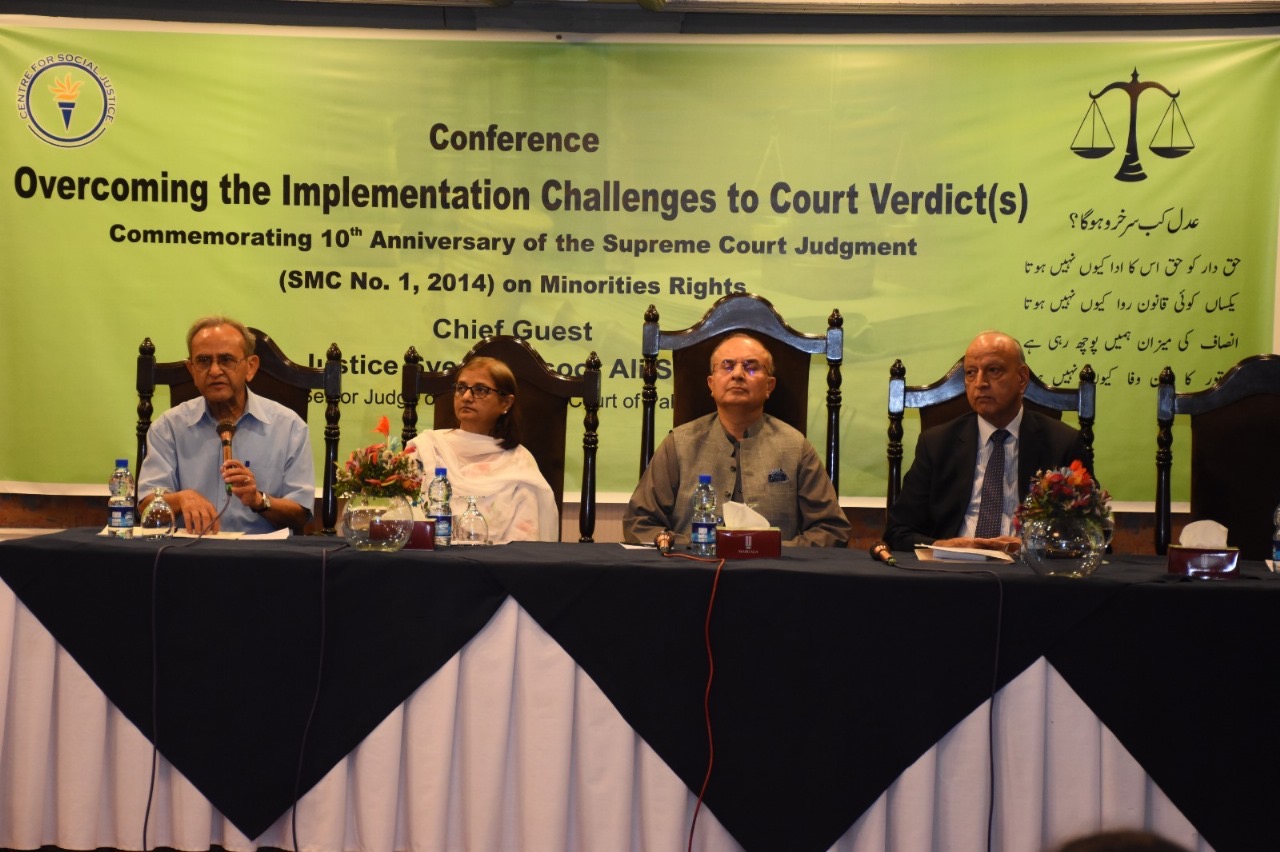
The Centre for Social Justice (CSJ) organizeda Conference titled “Overcoming the Implementation Challenge to Court Verdict(s)” to commemorate the 10th anniversary of the landmark judgment on minorities’ rights (SMC No. 1/2014). Honorable Justice Syed Mansoor Ali Shah was the Chief Guest of the Conference. The speakers included; Peter Jacob, Dr. Shoaib Suddle, Dr. A. H. Nayyar, Dr. Aslam Khaki, Dr. Yaqoob Khan Bangash, Saqib Jillani Advocate, Shafique Chaudhry, Jennifer Christine and Jayaa Jaggi, while Faaria Khan was the master of the ceremony.
Speaking on the occasion, Justice Syed Mansoor Ali Shah took note of the implementation challenges to the court verdict, and assured to take it to the conclusion to ensure that the judgment on minorities’rights is fully complied with in letter and spirit. He stressed that the implementation of court verdicts is a constitutional obligation of the executive institutions, and the disregard of court verdict is tantamount to a violation of the constitution. He emphasized that faith should be a matter of personal conviction, and all citizens of Pakistan have equal rights as guaranteed in the constitution of Pakistan. Justice Syed Mansoor Ali Shah emphasized that state institutions must effectively implement constitutional provisions to protect minorities from violence and violations, introduce strategies and polices to promote social harmony and tolerance, and protect the religious and cultural heritage of all communities, and establish institutions to address the grievances of minorities.
Peter Jacob, the Executive Director at CSJ, stated that the non-compliance of the Supreme Court Judgment on minorities’ rights in the past 10 years is evident, the weakness lies at all tiers of governance, hence an all-out effort is required to address this dysfunction of the implementers. We also need specialized platforms, including the implementation committees, monitoring bench, and for long-standing issues a National Commission for Minorities Rights. He said that the civil society and media have shouldered the responsibility of highlighting the need or lack thereof, regarding the enforcement of the court directives. Therefore, the government should now prioritize the implementation of their Judgment, not merely for minorities but to address the factors holding the country back from democratic development.
Saqib Jillani Advocate stated that I have been appearing before the Supreme Court bench for the past six years, watching over the implementation of Minorities Judgment as a legal counsel on behalf of the Human Rights Commission of Pakistan (HRCP), Centre for Social Justice (CSJ), and Cecil and Iris Foundation (CICF). I have seen lethargy on the part of the administration regarding the implementation of the directives in the judgment. My humble submission is that all institutions including Judiciary, Executive Branch and the parliament need to step up their efforts. He emphasized that we need more empathy and zeal from these institutions so that the promise of “equality for all” as guaranteed under the Constitution is fulfilled.
An academic and researcher, Dr. A. H. Nayyar stated that the most significant judgments of the Supreme Court of Pakistan underscoredthe plights of minorities and charted out the path to remedy the wrongs, however, they have remained unimplemented by the executive over ten years. He added that the issues included a blatant violation of the fundamental right of religious minorities enshrined in the Constitution, whereby the Constitution forbids forcing any person in any educational institution to learn religious studies of any faith other than his own. He stressed that lessons of Islamiyat must not be a part of the learning material of subjects like Urdu and English that are compulsory for students of all faiths. This defiance by the executive is tantamount to not only contempt of court but also a willful violation of a constitutional provision.
Dr. Shoaib Suddle said that the court orders on minorities’ rights have not been fully complied with, and one-man commission has been facing challenges due to the lack of progress made by government institutions. He urged that the implementation bench of Supreme Court must be constituted to carry out regular proceedings and empower the one-man commission with powers of contempt which will contribute to improving the implementation of the judgment.
Dr. Yaqoob Khan Bangash said that the four orders of the judgmentspeak broadly about issues that deal with hate speech, tolerance, and human rights violations. This judgment has significance for the enforcement of the rights of all citizens of Pakistan
The conference was well attended by lawyers, academics, human rights defenders and journalists, wherein the speakers raised their serious concerns over the lack of seriousness on the part of the federal and provincial governments to address human rights violations, and called upon the government to take concrete measures to protect religious freedom and minorities’ rights in accordance with the directions of the Judgment issued by Tassaduq Hussain Jillani, then Chief Justice of Pakistan in 2014.
At this juncture, CSJ’s assessment report “A Decade of Non-Compliance” was launched which is based on examining court proceedings, and assessing the level of compliance with the Supreme Court verdict on minorities’ rights. The report revealed that none of the original seven directions issued by the Supreme Court of Pakistan were fully complied with by either the federal or provincial governments despite the implementation Bench of the Supreme Court conducted 34 hearings, and issued a total of 89 supplementary directions over the last decade. The report revealed that the Sindh government achieved the highest compliance score with 9 out of 25, followed by the Punjab government with an 8/25 score. Balochistan and Khyber Pakhtunkhwa governments achieved implementation scores of 6/25 and 5/25 respectively. The federal government had the lowest compliance score, reflecting stalled progress in adhering to court directions.
Editor: Kamran Raja